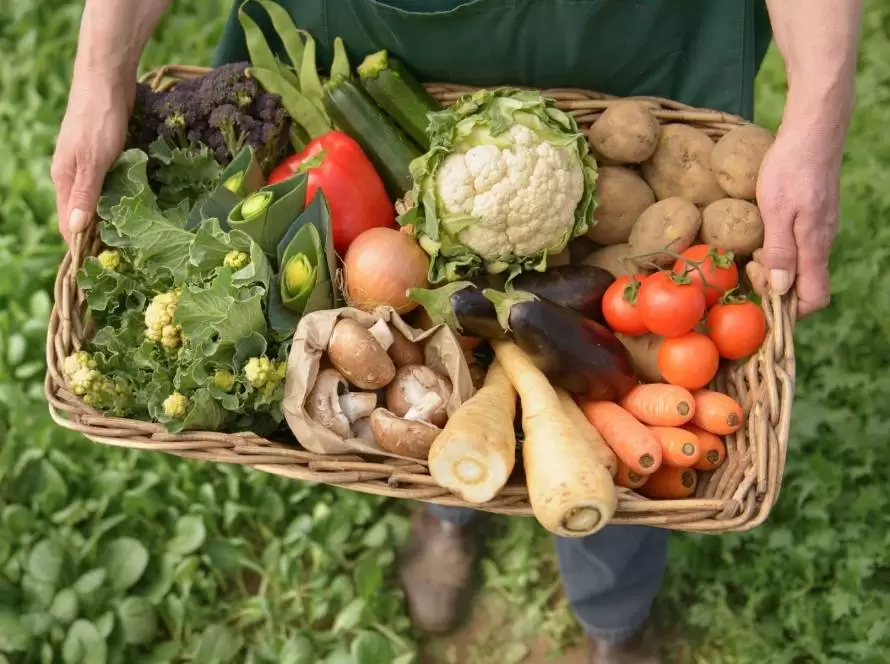Let food be thy medicine and medicine be thy food. ~ Hippocrates (400 BC)
The importance of food and eating is infinitely immense. Apart from giving us nourishment, the right foods can alleviate many of our health problems. Eating right is a statement we often seem to neglect, but its merits are undeniable. This way, Hippocrates’s philosophy ‘food as medicine’ often gets largely neglected in today’s fast-paced life. And when we talk about food, the right one precisely, we mustn’t forget the challenges that are involved when it comes to food production and growing enough for everyone, all across the world, as the world population continues to soar. As the demand and supply ratio fluctuates, we take recourse to the ‘Green Revolution’ and its chemical-based technology.
However, things had been different a couple of centuries back. For thousands of years, farming was done without any artificial compounds. Artificial fertilisers were first developed during the mid-19th century. Before that, the world had only known organic farming. Organic farming is an agricultural approach that involves cultivating and nurturing crops devoid of the use of artificial based fertilisers and pesticides. It depends on ecologically stable agricultural standards like crop rotation, green manure, organic waste and organic pest control. When the world is getting tormented with unknown and unheard-of ailments, we need to get rid of all possible contaminants. We have to get back to the basics, understand what nature offers us and how it can cure us. The need of the hour is organic cultivation and creation of food for all.
Shillim Cooking School and Organic Farm
At Shillim Institute we believe in building connections that can transform the world in unique ways. The cooking school and organic farm in here is a model organic, sustainable agricultural farming project, which now is a full-fledged model organic farm garden situated within the Dharana Shillim Wellness Retreat. It offers a range of cooking classes for both professionals and food enthusiasts. At the Shillim cooking school and farm, our endeavour remains to inspire the world at large to eat fresh and what’s in season. The vision is to achieve a sustainable farm-to-table ecosystem that protects and conserves the limited natural resources.
Surrounded by the Western Ghats, Shillim farm garden believes in responsible farming and is proud to be 100% organic. The produce comes from non-GMO, non-treated seeds as the plants are mainly organic heirloom varieties for their beauty and taste. Classes on composting, soil preparation, seed saving, planting and harvesting are available for children and adults.
Organic farming principles
Principle of health
Organic agriculture must add to the health and wellbeing of soil, plants, animals, humans and the earth. It is the nourishment of mental, physical, environmental and social welfare. For instance, it offers contamination and chemical-free, healthy food substances for humans.
Principle of impartiality
Fairness is evident in preserving equity and justice of the shared planet both among humans and other living beings. Organic farming offers a good quality of life and helps in lowering poverty. Natural resources must be wisely used and protected for future generations.
Principle of environmental balance
Organic farming must be patterned on living ecological systems. Organic farming techniques must fit into the natural stability and cycles in the environment.
Principle of care
Organic agriculture should be performed carefully and sensibly to benefit the present and future generations and the natural environment.
Benefits of organically cultivated agricultural produce
Better nutrition and taste
Organic food is much more abundant in nutrients. The mineral and vitamin content characterises the nutritive value of a food item. Organic farming also improves the nutrients of the soil. Organic food often tastes better than other forms of farming.
Lower use of pesticides
Eating organic produce reduces the number of chemicals and pesticides in the diet. The use of insecticides, fungicides, fertilisers and weed killers are avoided in organic food production. Organic farming is done devoid of the use of toxic pesticides.
Lower use of synthetics
No synthetic colours, flavours or preservatives are accepted in organic food. No artificial preservatives, colours or flavours are permissible in organic food. Organic food contains more vitamins, minerals and micronutrients than traditionally raised food.
Usage of pure water
Organic farming never utilises sewage sludge. Sewage sludge is a by-product of the wastewater treatment and contains numerous known and unknown dangerous materials. Once treated, dirty mud can be used to agricultural cropland as fertiliser, this chemical broth that is often loaded with toxic compounds, the nanomaterial is entering into the food that we consume. But not in organic food! Organic farming uses only pure natural water for cultivation.
No radiation of food
Organic food is never irradiated. Irradiated food is subjected to intense ionising radiation. With food radiation, radiant energy – electrons, gamma rays or x-rays, breaks chemical bonds, and the intent is to lessen microorganisms, and importantly, radiotherapy, which is known to cause cancer.
Environmental balance
Organic farming supports carbon sequestration, which helps to mitigate rising atmospheric carbon dioxide levels.
Reduces risks of cancer
Eating organic can reduce the risk of cancer. Various research has found out that those who mostly eat organic foods were more likely to ward off all types of cancer contrasted to those who rarely or never ate organic foods.
Organic farming is a holistic vegetable production system that fosters and boosts agro-ecosystem health. Research has shown that organic farming techniques can generate even higher harvests than conventional methods. The importance of organic toxic-free farming methods has the potential to rejuvenate both urban and rural regions agricultural systems.

